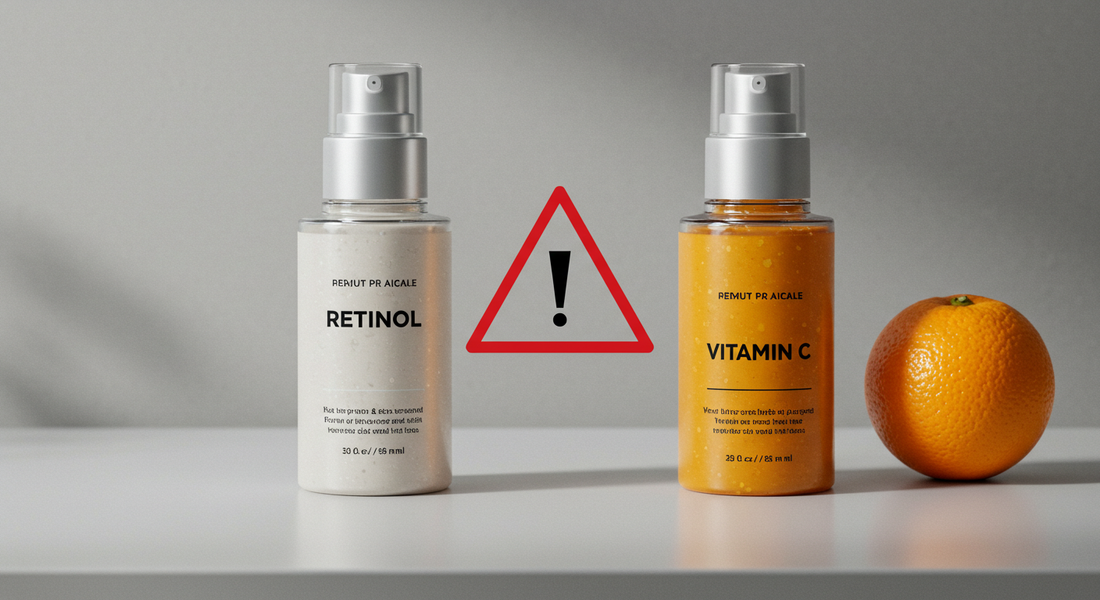
Top 5 Skincare Ingredients You Should Never Mix (and Why)
Share
In the ever-evolving world of skincare, understanding the complex interactions between various ingredients is crucial for achieving healthy, radiant skin. While some combinations can work synergistically to enhance the efficacy of your routine, others can lead to undesirable and even damaging effects. As a skincare enthusiast, it's important to be aware of the top skincare ingredients that should never be mixed, and why.
Retinol and Vitamin C
Retinol, a derivative of vitamin A, is a powerful anti-aging ingredient that helps to stimulate collagen production, reduce the appearance of fine lines and wrinkles, and improve skin texture. Vitamin C, on the other hand, is a potent antioxidant that can brighten the complexion and protect the skin from environmental stressors.
While both of these ingredients are highly beneficial for the skin, they should not be used together. Retinol and vitamin C operate at different pH levels, and when combined, they can neutralize each other's effects, leading to reduced efficacy and potential skin irritation. The acidic nature of vitamin C can also deactivate the retinol, rendering it less effective.
To reap the full benefits of these two ingredients, it's best to use them at different times of the day or on alternating days. Apply retinol at night and vitamin C in the morning for optimal results.
Niacinamide and AHA/BHA
Niacinamide, a form of vitamin B3, is a versatile ingredient that can help to regulate oil production, minimize the appearance of pores, and improve the overall complexion. Alpha-hydroxy acids (AHAs) and beta-hydroxy acids (BHAs), on the other hand, are exfoliating agents that can help to remove dead skin cells and unclog pores.
While both niacinamide and AHA/BHA are beneficial for the skin, they should not be used together. The combination can lead to increased skin sensitivity, redness, and irritation. Additionally, the exfoliating properties of AHA/BHA can reduce the effectiveness of niacinamide, as they can disrupt the skin's natural barrier.
To incorporate both niacinamide and AHA/BHA into your routine, it's best to use them at different times of the day or on alternating days. Apply niacinamide in the morning and AHA/BHA in the evening for the best results.
Benzoyl Peroxide and Retinol
Benzoyl peroxide is a popular acne-fighting ingredient that works by killing acne-causing bacteria and reducing inflammation. Retinol, as mentioned earlier, is a powerful anti-aging ingredient that can also be effective in treating acne.
While both of these ingredients can be beneficial for the skin, they should not be used together. Benzoyl peroxide has a neutralizing effect on retinol, reducing its efficacy and potentially causing skin irritation. Additionally, the combination can lead to excessive dryness and peeling, which can compromise the skin's barrier function.
To use both benzoyl peroxide and retinol in your routine, it's best to apply them at different times of the day or on alternating days. Use benzoyl peroxide in the morning and retinol at night for the best results.
Vitamin C and AHA/BHA
Vitamin C, as mentioned earlier, is a powerful antioxidant that can help to brighten the complexion and protect the skin from environmental stressors. AHA/BHA, on the other hand, are exfoliating agents that can help to remove dead skin cells and unclog pores.
While both of these ingredients can be beneficial for the skin, they should not be used together. The acidic nature of vitamin C and AHA/BHA can create a pH imbalance, leading to increased skin sensitivity and potential irritation. Additionally, the combination can cause the skin to become overly dry and stripped of its natural oils.
To incorporate both vitamin C and AHA/BHA into your routine, it's best to use them at different times of the day or on alternating days. Apply vitamin C in the morning and AHA/BHA in the evening for the best results.
Salicylic Acid and Retinol
Salicylic acid is a BHA that can help to unclog pores, reduce inflammation, and treat acne. Retinol, as mentioned earlier, is a powerful anti-aging ingredient that can also be effective in treating acne.
While both of these ingredients can be beneficial for the skin, they should not be used together. The combination can lead to over-exfoliation, causing the skin to become dry, irritated, and sensitive. Additionally, the use of both salicylic acid and retinol can compromise the skin's barrier function, leading to increased water loss and potential long-term damage.
To use both salicylic acid and retinol in your routine, it's best to apply them at different times of the day or on alternating days. Use salicylic acid in the morning and retinol at night for the best results.
Conclusion
Navigating the world of skincare can be a delicate balance, and understanding the interactions between various ingredients is crucial for maintaining healthy, radiant skin. By being aware of the top skincare ingredients that should never be mixed, you can create a personalized routine that maximizes the benefits of each product while minimizing the risk of irritation and potential long-term damage.
Remember, when it comes to skincare, it's always best to consult with a dermatologist or skincare professional to ensure that your routine is tailored to your unique skin type and concerns. With the right knowledge and guidance, you can achieve the healthy, glowing complexion you've been dreaming of.
